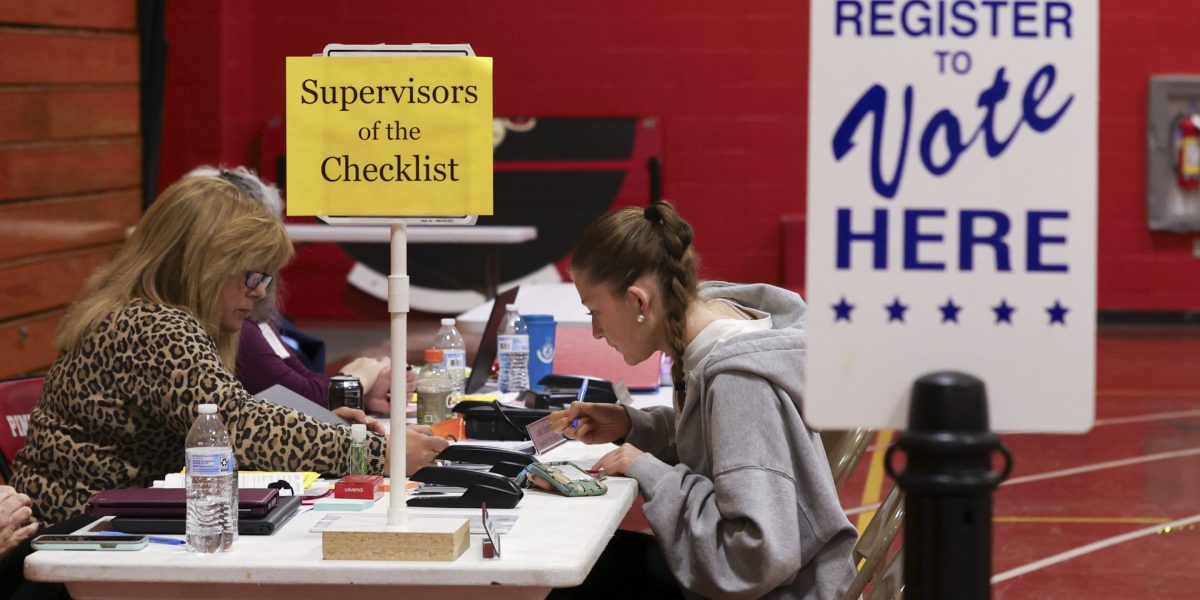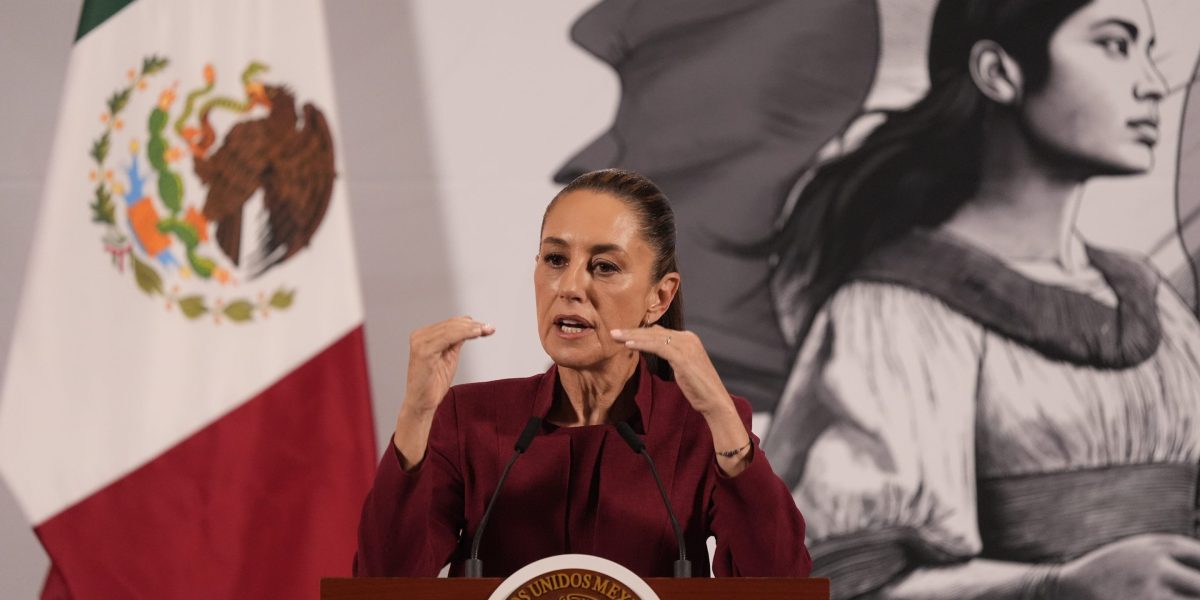President Donald Trump on Tuesday signed a sweeping executive action to overhaul elections in the U.S., including requiring documentary proof of citizenship to register to vote in federal elections and demanding that all ballots be received by Election Day.
The order says the U.S. has failed “to enforce basic and necessary election protections” and calls on states to work with federal agencies to share voter lists and prosecute election crimes. It threatens to pull federal funding from states where election officials don’t comply.
The move, which is likely to face swift challenges because states have broad authority to set their own election rules, is consistent with Trump’s long history of railing against election processes. He often claims elections are being rigged, even before the results are known, and has waged battles against certain voting methods since he lost the 2020 election to Democrat Joe Biden and falsely blamed it on widespread fraud.
Trump has focused particularly on mail voting, arguing without evidence that it’s insecure and invites fraud even as he has shifted his position on the issue given its popularity with voters, including Republicans. While fraud occurs, it’s rare, limited in scope and gets prosecuted.
The order’s documentary proof of citizenship requirement signals that the president is not waiting for congressional Republicans to pass their long-anticipated Safeguard American Voter Eligibility Act, or SAVE Act, which has aimed to do the same thing.
Republicans have defended that measure as necessary to restore public confidence in elections. Voting in federal elections by noncitizens is already illegal and can result in felony charges and deportation.
Voting rights groups have expressed concerns that the requirement could disenfranchise people. An estimated 9% of U.S. citizens of voting age, or 21.3 million people, do not have proof of citizenship readily available, according to a 2023 report by the Brennan Center for Justice and other groups.
There are also concerns that married women who have changed their names will encounter trouble when trying to register because their birth certificates list their maiden names. Such hiccups happened in recent town elections in New Hampshire, which has a new state law requiring proof of citizenship to register to vote.
Trump’s order directs federal agencies including the Department of Homeland Security, the Social Security Administration and the State Department to share with election officials federal data that could help them identify noncitizens on their rolls.
It also says the attorney general should “prioritize enforcement of federal election integrity laws” in states that don’t share information about suspected election crimes with the federal government.
The order aims to require votes to be “cast and received” by Election Day and says federal funding should be conditional on state compliance. Currently, 18 states and Puerto Rico accept mailed ballots received after Election Day as long they are postmarked on or before that date, according to the National Conference of State Legislatures.
Trump’s order is likely to face legal challenges, given that the Constitution gives authority over elections to the states. While Congress has the power to regulate voting — and has done so to pass such laws as the Voting Rights Act — the Constitution makes clear that states have primary authority to set the “times, places and manner” for elections.
Colorado’s Democratic secretary of state, Jena Griswold, called the order an “unlawful” weaponization of the federal government and said Trump is “trying to make it harder for voters to fight back at the ballot box.”
Democratic Rep. Joe Morelle of New York, the ranking member of the House committee that oversees elections, said the executive order “is not just misguided — it is immoral and illegal.”
At least one Democratic attorney on Tuesday threatened legal action. Marc Elias, who has been the subject of Trump’s ire, said in a social media post: “This will not stand. We will sue.”
The executive branch does have some authority over elections, said Justin Levitt, a constitutional law expert and former White House senior policy adviser during the Biden administration. He said some federal agencies provide election support, including the U.S. Election Assistance Commission, which distributes federal grant money to states and runs a voluntary certification program for voting systems. The U.S. Cybersecurity and Infrastructure Security Agency helps election officials protect their systems.
Former President Biden issued an executive order in 2021 directing federal agencies to take steps to boost voter registration, which drew complaints from Republicans who called it federal overreach. Trump has rescinded that order.
Trump’s order calls on the Election Assistance Commission to amend voting system guidelines to protect election integrity, including guidance that voting systems should not use a ballot that uses a barcode or QR code in the vote counting process. It said the commission should condition the funding it distributes to states on those new guidelines.
Virtually all in-person voters in Georgia, as well as voters in several other states, use voting machines with a large touchscreen to record their votes. The machines then print a paper ballot with a human-readable summary of the voter’s selections and a QR code, a type of barcode, that is read by a scanner to count the votes.
It is not entirely clear how the executive order would affect Georgia and the other jurisdictions that use these machines. Representatives for Secretary of State Brad Raffensperger did not immediately respond Tuesday evening to messages seeking comment. Raffensperger issued a statement thanking Trump for the executive order, calling it a “great first step for election integrity reform nationwide.”
Rep. Bryan Steil of Wisconsin, the chairman of the House committee that oversees elections, said the order is a “welcome action to secure our elections and prevent foreign influence.”
Mike Lindell, a Trump ally who spreads election conspiracies and who wants to ban voting systems in favor of hand-counting ballots, fundraised off the news on Tuesday, saying in an email it will fix our “sick elections.”
Trump’s executive order comes as the Republican National Committee launched a massive effort to probe voter registration list maintenance nationwide. The committee sent public records requests this week asking for documents related to voter roll list maintenance in 48 states and Washington, D.C., asserting that the public should know how states are removing ineligible people from voter rolls, including dead people and non-citizens.
Trump referenced election fraud as he signed the order Tuesday, saying, “this will end it, hopefully.” He added that more election actions would be taken in coming weeks.
This story was originally featured on Fortune.com
Source link

 Entertainment8 years ago
Entertainment8 years ago
 Politics8 years ago
Politics8 years ago
 Entertainment8 years ago
Entertainment8 years ago
 Entertainment8 years ago
Entertainment8 years ago
 Tech8 years ago
Tech8 years ago
 Tech8 years ago
Tech8 years ago
 Tech8 years ago
Tech8 years ago
 Politics8 years ago
Politics8 years ago







